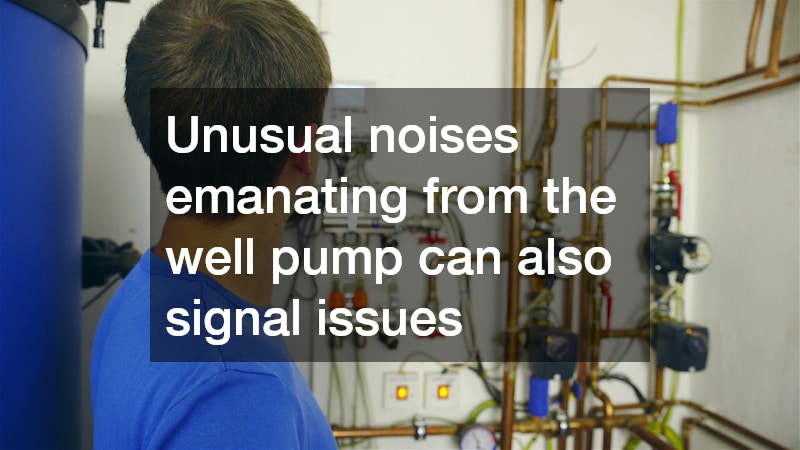
Key Signs Its Time to Call a Well Pump Company
Contacting a well pump company is your first line of defense against pump failure. The importance of well pumps in providing a reliable water supply for homes relying on well systems cannot be overstated. These pumps are integral to drawing water from underground sources, ensuring households have access to clean and fresh water.
However, like any mechanical system, well pumps can experience issues that may signal potential failure if not addressed promptly.
Regular maintenance and monitoring are crucial for the long-term health of your well pump. Homeowners should be vigilant in recognizing the signs that indicate it may be time to call in a professional well pump company. By identifying these indicators early on, you can prevent minor issues from escalating into significant problems that could lead to costly repairs or even the replacement of the entire system.
From fluctuating water pressure to deteriorating water quality, understanding these signs can help you maintain a reliable water supply.
Indicators of a Failing Well Pump
Fluctuating water pressure is one of the most common indicators that your well pump might be nearing failure. If you notice that your water pressure is inconsistent—sometimes strong and sometimes weak—it could signify that your pump is struggling. Such pressure fluctuations can result in inconvenience and affect daily activities that depend on a stable water supply.
Unusual noises emanating from the well pump can also signal issues. If you hear grinding, rumbling, or any other strange sounds while the pump is operating, it may indicate mechanical failure or the presence of debris within the pump. Recognizing these noises early is essential, as they could prevent further damage and costly repairs.
Another telling sign can be the frequency at which your pump cycles on and off. Frequent cycling can indicate that the pump is working harder than it should be, which can be a symptom of problems like a malfunctioning water pressure switch or a leak in the system. Addressing these issues promptly can help extend the life of your well pump.
Low Water Quality
Changes in water quality often manifest as noticeable odors, which may indicate contamination or bacterial growth in the well water. An unpleasant smell, such as a rotten egg odor, could be a sign of sulfur bacteria, which needs immediate attention. This degradation of water quality can pose potential health risks for residents.
Taste is another factor to consider when assessing the quality of your well water. If you notice a metallic or bitter taste, it could be a result of excessive minerals or other harmful contaminants in the water supply. Deteriorating taste is often linked with the performance of the well pump, making it vital to examine your system closely.
Finally, the color of your water can also provide critical information about its quality. Cloudy, discolored water is a red flag; it may indicate sediment, rust, or other particles that compromise the water supply’s safety. Each of these signs is crucial in determining whether it’s time to call a well pump company for a thorough inspection.
Inconsistent Water Supply
An inconsistent water supply can be frustrating and requires immediate investigation. Often, issues with the well pump itself are the root cause, whether due to mechanical failure, electrical issues, or a problem with the power supply. Understanding these potential pitfalls can help homeowners take proactive measures to restore water consistency.
In addition, if there are changes in nearby properties or development, it could affect the water table levels and subsequently impact your well’s ability to provide a steady supply. Seasonal changes and drought can also lead to fluctuations, emphasizing the need for regular monitoring and consultations with well pump professionals.
Moreover, other components of the well water system, such as pressure tanks and filters, can also play a significant role in water delivery. Therefore, an inconsistent supply may not solely point to the pump but rather a combination of issues needing assessment and repair by a qualified company.
Constant Running
A well pump that runs continuously is a matter of concern, as it not only leads to higher energy costs but can also result in undue wear and tear on the pump itself. This constant operation might indicate that the pump is struggling to maintain the water pressure needed, which could be due to lead or leaks in the system.
Homeowners should be aware of their pump’s normal operating cycle. A deviation from this norm often requires a technician’s expertise to evaluate the cause correctly. Neglecting a constantly running pump can lead to more significant problems, including increased repair costs or the need for complete replacement.
It’s advisable to consult with a well pump company if you notice a continuous operation of your pump. They can help troubleshoot potential issues and are equipped to perform a detailed analysis of your well water system. Addressing this issue sooner rather than later can save you money and extend the lifespan of your well pump.
Staying aware of the key signs that indicate it’s time to call a well pump company can make all the difference in maintaining a reliable water supply. Fluctuating water pressure, changes in water quality, inconsistent supply, and a constantly running pump are all critical factors that cannot be ignored.
Regular monitoring and prompt attention to any potential issues not only prolong the life of your well pump but also prevent the risk of costly repairs down the line. If you recognize any of the signs discussed in this article, don’t hesitate to reach out to a professional well pump company to evaluate your system.
Investing in the care and maintenance of your well pump is an investment in your home’s infrastructure and health. Your well pump is a vital component of your home; treating it with the respect it deserves will ensure the best outcomes for years to come.


